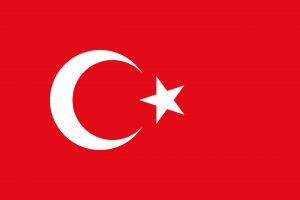Difference between revisions of "Language/Turkish/Grammar/Be-Polite"
Jump to navigation
Jump to search
m (Quick edit) |
m (Quick edit) |
||
| Line 3: | Line 3: | ||
Turkish society is very hierarchical. It is necessary to mark by sometimes heavy flattery the chance which one has to meet a celebrity, a professor, an imam, a high official or, more simply, a venerable old man. The gesture of raising the head while making a "Tssk!" on the tip of the lips is not contemptuous, despite appearances, it simply means: "No! " | Turkish society is very hierarchical. It is necessary to mark by sometimes heavy flattery the chance which one has to meet a celebrity, a professor, an imam, a high official or, more simply, a venerable old man. The gesture of raising the head while making a "Tssk!" on the tip of the lips is not contemptuous, despite appearances, it simply means: "No! " | ||
<span link>Consider broadening your understanding by checking out these related lessons:</span> [[Language/Turkish/Grammar/RE%C4%B0TERAT%C4%B0VE|REİTERATİVE]], [[Language/Turkish/Grammar/Gender|Gender]], [[Language/Turkish/Grammar/Ordinal-Numbers-in-Turkish|Ordinal Numbers in Turkish]] & [[Language/Turkish/Grammar/Pronouns|Pronouns]]. | |||
==Polite formulas== | ==Polite formulas== | ||
* Welcome: hos geldiniz. | * Welcome: hos geldiniz. | ||
| Line 24: | Line 25: | ||
* https://www.promovacances.com/guide-voyage/turquie/pays,220/infos-pratiques/usages-et-politesses/ | * https://www.promovacances.com/guide-voyage/turquie/pays,220/infos-pratiques/usages-et-politesses/ | ||
== | ==Other Lessons== | ||
* [[Language/Turkish/Grammar/Quantity-in-Turkish|Quantity in Turkish]] | * [[Language/Turkish/Grammar/Quantity-in-Turkish|Quantity in Turkish]] | ||
* [[Language/Turkish/Grammar/Pronouns|Pronouns]] | * [[Language/Turkish/Grammar/Pronouns|Pronouns]] | ||
| Line 35: | Line 36: | ||
* [[Language/Turkish/Grammar/The-Ablative-Case-in-Turkish|The Ablative Case in Turkish]] | * [[Language/Turkish/Grammar/The-Ablative-Case-in-Turkish|The Ablative Case in Turkish]] | ||
* [[Language/Turkish/Grammar/Past-Tense|Past Tense]] | * [[Language/Turkish/Grammar/Past-Tense|Past Tense]] | ||
<span links></span> | |||
Latest revision as of 19:40, 27 March 2023
How to be polite in Turkish
Turkish society is very hierarchical. It is necessary to mark by sometimes heavy flattery the chance which one has to meet a celebrity, a professor, an imam, a high official or, more simply, a venerable old man. The gesture of raising the head while making a "Tssk!" on the tip of the lips is not contemptuous, despite appearances, it simply means: "No! "
Consider broadening your understanding by checking out these related lessons: REİTERATİVE, Gender, Ordinal Numbers in Turkish & Pronouns.
Polite formulas[edit | edit source]
- Welcome: hos geldiniz.
- Hi/Hello!: merhaba.
- Hello (in the morning): günaydin.
- Good evening: iyi aksamlar.
- Good night: iyi geceler.
- Goodbye: allaha ismarladik.
- Have a good trip: güle, güle.
- Please: lütfen.
- Thank you !: mersi, tesekkür ederim.
- How is it going ?: nasilsiniz?
- Very good: iyiyim.
- Health !: serene!
- That's nice: naziksiniz.
- to request: rica etmek.
- can you do it?: yapabilir misin?
- good work: iyi çalışmalar.
Sources[edit | edit source]
Other Lessons[edit | edit source]
- Quantity in Turkish
- Pronouns
- The Accusative Case in Turkish
- How to use ¨can¨ in Turkish
- Future Tense
- Indefinite Articles in Turkish
- Definite Articles in Turkish
- Nouns
- The Ablative Case in Turkish
- Past Tense
